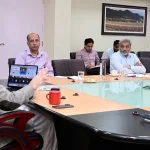Poultry farming in Jammu and Kashmir has a long history, with traditional farming methods dating back centuries. However, in recent years, the sector has undergone significant modernisation and expansion.
The introduction of new technologies and improved breeding techniques has led to an increase in production and quality of poultry products, transforming the sector from a source of supplementary income and proteinic foods for families to a major commercial activity that generates significant revenue.
This growth can be attributed to a number of factors, including changes in food habits, rise of the middle class and their increased income, presence of private companies in the industry, and increasing demand for poultry products in the market.
The UT government has played a key role in promoting the development of the poultry sector. It has implemented various initiatives and schemes to support farmers and encourage the growth of the industry like providing subsidies and financial assistance to farmers, promoting backyard poultry farming, establishing training and capacity building programs, and encouraging the use of modern technology in poultry farming. However, with the increasing demands the sector has become dependent on imported poultry produce and raw material which has become a cause for concern and puts the local poultry industry at a disadvantage.
To put the poultry sector on the path of sustainability and self-reliance the Agriculture Production Department has approved a ‘Roadmap for poultry development in J&K’ under its mission for Holistic Development of Agriculture and Allied Sectors in the UT. “Every year the UT experiences a flight of capital on account of poultry imports to the tune of Rs. 1273 Cr. Among these table eggs account for Rs. 473 Cr, day old chicks for Rs. 110 Cr, poultry feed worth Rs. 300 Cr and broiler birds for Rs. 390 Cr”, said Atal Dulloo, Additional Chief Secretary APD.
The ACS said that this flight however, can also be viewed as an opportunity for generating local enterprises and creating jobs for our educated youth for which various interventions under the project are being implemented. He added that a total of 420 enterprises and 4250 direct jobs are being created under this project over the next five years.
Similarly, the UT spends Rs. 473 crores on import of table eggs annually. These eggs again are imported and on average reach J&K after 15-30 days of being laid. Eggs are an important source of nutrition for all age groups especially children and freshness is the most important component when evaluating the quality of an egg. Under the project 200-layer farms, each of 10000 bird capacity are being established to produce 60 crore eggs within a span of five years.
In addition, backyard and the free range poultry farming has also been covered under various incentives for which inputs are being provided through establishment of 66 Mother Units, each of 1000 parent stock. These mother units shall provide birds to more than 2000 free-range farms housing 500 birds each.
One of the main challenges facing poultry farmers in Jammu and Kashmir is the high cost of feed, which can make production expensive. To address this issue, the project has put a target of producing 85000 Metric Tons of poultry feed within a span of five years by establishing 35 units (7 feed units per year) of 1 ton per hour capacity. Apart from this the APD has implemented measures to increase the production of feed locally, including promoting the cultivation of maize and other feed crops under other projects.
All these interventions shall boost the gross output of the Poultry Sector in J&K from Rs. 709 Cr to Rs. 1982 Cr per year and ensure that the poultry industry is well-positioned for continued growth and development in the coming years.





